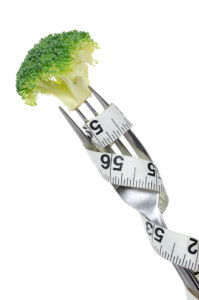 When I tell people about my work, they often start nodding their head. They agree with the value of being tuned in to one’s body and having a positive body image. They’re onboard the “Diets Don’t Work” train with me. Thankfully, many people understand that stringent diets will backfire in the long run.
When I tell people about my work, they often start nodding their head. They agree with the value of being tuned in to one’s body and having a positive body image. They’re onboard the “Diets Don’t Work” train with me. Thankfully, many people understand that stringent diets will backfire in the long run.
But something curious happens as we talk more. Our cultural belief system around weight and dieting is prevalent, and therefore invisible. [Tweet “A diet mindset often subtly underlies our assumptions.”] No wonder the same people who “get it” will still often say things like:
- Yesterday after I counted up my points, I could still have more to eat. So I measured an ounce of chocolate.
- I baked my mom’s carrot cupcakes. They were so delicious, they were totally worth the carbs.
- I want to be healthier, so I’m trying to lose 30 pounds.
- I don’t weigh myself. I just go by how my clothes fit.
- If I want to eat a cheeseburger for lunch, I do. Then I cut back at dinner.
Every one of those statements stems from a diet mindset. Every one of those statements came from someone who claimed they don’t diet. But when you understand that a diet = any external rules of what, when, or how much to eat, then it makes sense. Here are those same statements, along with clarification about how they are really a diet in disguise.
- Yesterday after I counted up my points, I could still have more to eat. So I measured an ounce of chocolate.
– Counting calories, points, or fat grams or carb grams relies on external methods to determine how much you can eat. It is the exact opposite of recognizing your body’s internal cues of hunger and satiety. - I baked my mom’s carrot cupcakes. They were so delicious, they were totally worth the carbs.
– Excluding or greatly limiting a macronutrient (fat, carbohydrates, or protein) places a value judgment on types of food. It sets up a mentality that if you eat certain foods, you are “cheating.” Ironically, you often end up craving exactly the foods you have been trying to avoid. Nutritionally, you may be shortchanging yourself as well. - I want to be healthier, so I’m trying to lose 30 pounds.
– This comes from a mindset that there is a magic number of pounds that brings health and happiness. In this particular case, a 30-pound goal was chosen somewhat randomly. It was ten pounds lighter than she’d ever been in her adult life, so she thought it was desirable. It isn’t the weight that causes health. Rather, it’s that the same behaviors that support better health (exercise, not bingeing) may also result in weight loss. - I don’t weigh myself. I just go by how my clothes fit.
– It is true that you could wear a smaller size even if you’ve gained pounds, because muscle weighs more than fat. However, it’s merely substituting one external measure for another. When you are tuned in to your body’s cues for hunger and satiety, your weight tends to stabilize. You don’t have to try on your skinny jeans to keep you in line. - If I want to eat a cheeseburger for lunch, I do. Then I cut back at dinner.
– This is a subtle one, because it seems like common sense. The underlying spirit is what’s important here. A cheeseburger for lunch then a salad for dinner is reasonable if you know that lunch will be extra-filling, so you will only want a light dinner. It’s a different story if you are planning salad for dinner to atone for eating a cheeseburger. In one scenario, your come-from place is internal; the other is external. Having an external focus keeps you out of touch with your body.
Image © Charlieaja | Dreamstime Stock Photos & Stock Free Images






